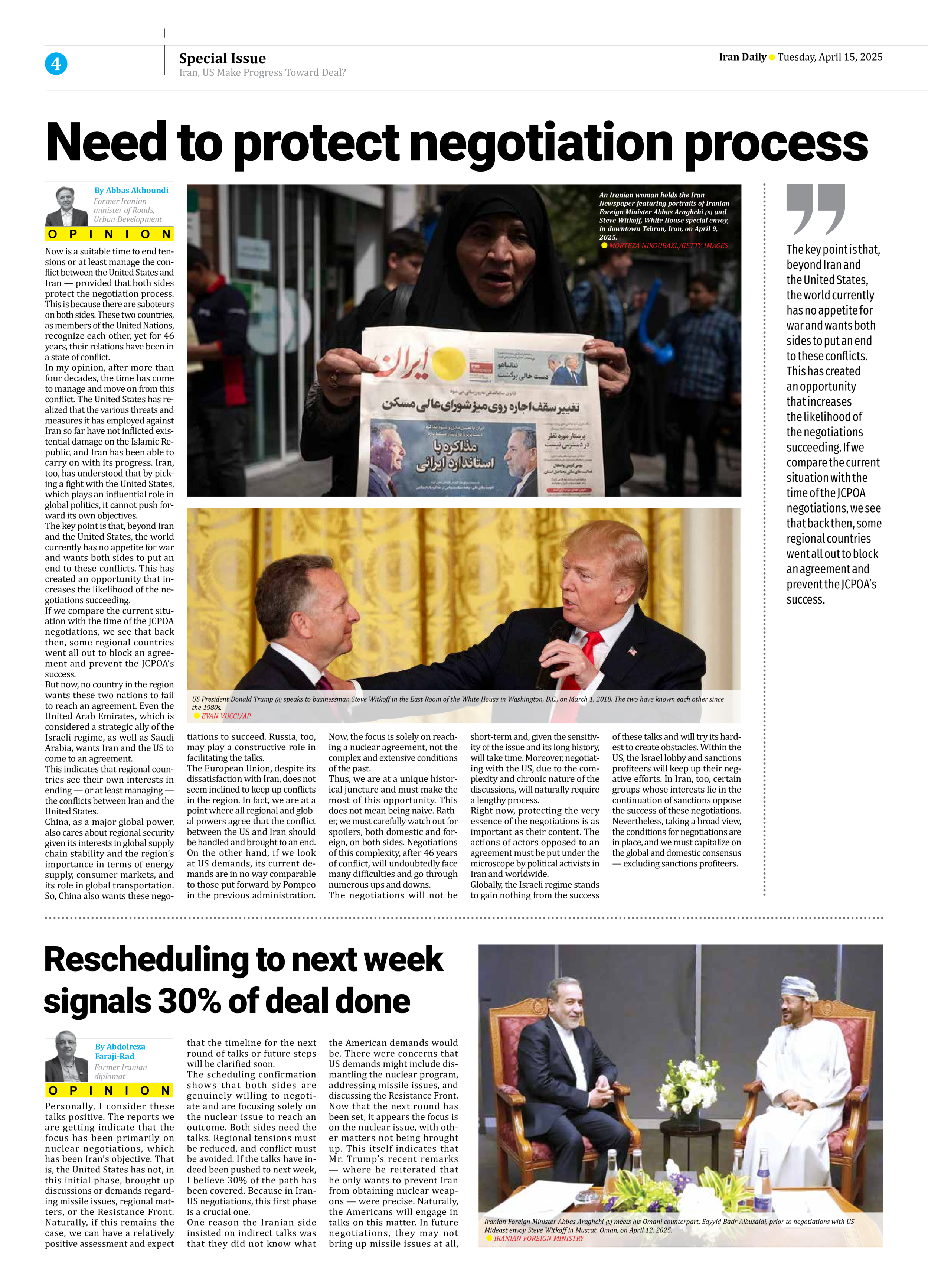
Rescheduling to next week signals 30% of deal done
By Abdolreza
Faraji-Rad
Former Iranian diplomat
Personally, I consider these talks positive. The reports we are getting indicate that the focus has been primarily on nuclear negotiations, which has been Iran’s objective. That is, the United States has not, in this initial phase, brought up discussions or demands regarding missile issues, regional matters, or the Resistance Front. Naturally, if this remains the case, we can have a relatively positive assessment and expect that the timeline for the next round of talks or future steps will be clarified soon.
The scheduling confirmation shows that both sides are genuinely willing to negotiate and are focusing solely on the nuclear issue to reach an outcome. Both sides need the talks. Regional tensions must be reduced, and conflict must be avoided. If the talks have indeed been pushed to next week, I believe 30% of the path has been covered. Because in Iran-US negotiations, this first phase is a crucial one.
One reason the Iranian side insisted on indirect talks was that they did not know what the American demands would be. There were concerns that US demands might include dismantling the nuclear program, addressing missile issues, and discussing the Resistance Front.
Now that the next round has been set, it appears the focus is on the nuclear issue, with other matters not being brought up. This itself indicates that Mr. Trump’s recent remarks — where he reiterated that he only wants to prevent Iran from obtaining nuclear weapons — were precise. Naturally, the Americans will engage in talks on this matter. In future negotiations, they may not bring up missile issues at all, but they could hold discussions on certain Middle East matters, for instance, on how Iran could help reduce tensions in the Red Sea. For now, however, the focus on the nuclear issue is positive, and it is expected that the talks will carry on.
US must show will to lift sanctions
If we consider the first round positive, it means that in later stages, both sides must work on confidence-building to ensure Iran does not acquire nuclear weapons and that sanctions are lifted. For this to happen, one step would be for Iran to show its willingness to scale back 60% enrichment. If Iran agrees to bring down its 60% enrichment, this part of the negotiations will drag on, with both sides haggling over the extent of the reduction.
Another key issue is sanctions. Iran expects that if talks progress over several rounds and trust is built, some sanctions will be eased and the US side will demonstrate its readiness to remove sanctions.
The Americans expect the International Atomic Energy Agency to step up its monitoring and oversight. Iran’s nuclear activities during the negotiations and Mr. Grossi’s upcoming visit to Iran are crucial. If Mr. Grossi delivers a positive report, it will indicate that part of the Iran-US talks has been smoothed out. Therefore, bargaining must also take place on the issue of inspections, and an agreement between Iran and the IAEA should be reached — which could shorten the duration of negotiations.
Trump likely wants to bypass Europeans
Alongside these matters, Iran must engage with Europe, and talks with Russia and China are also important, as all these countries are part of the P5+1 group. Mr. Trump appears to want to bypass the Europeans, which will likely draw protests from them. Therefore, Iran must avoid repeating its past mistakes with Europe, move closer to them, and provide updates. Iran must also take the snapback issue seriously. Ultimately, before snapback comes into play, Iran needs to reach a broad agreement with the US so that the Europeans can more comfortably set aside the issues of sanctions and snapback.
I predict that the talks will ultimately move toward becoming direct. The question now is whether the next round on Saturday will be direct or not. In any case, preliminary discussions have already taken place between the two sides through the mediation of Oman’s foreign minister. Both sides have returned to their respective countries and reported back to their leaders — whether in Iran or the US. They will then decide whether the next round of talks should be direct or indirect. However, in my opinion, the negotiations will most likely be direct. There is a chance of this, though it is not certain.
The article first appeared in
Persian on ILNA.







